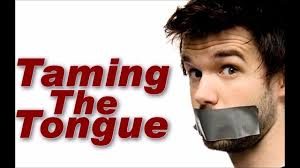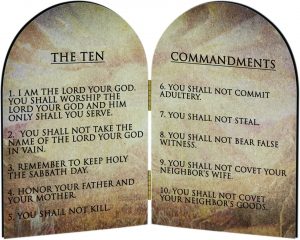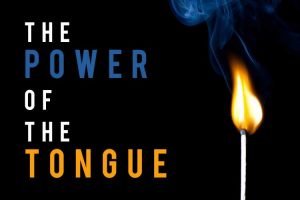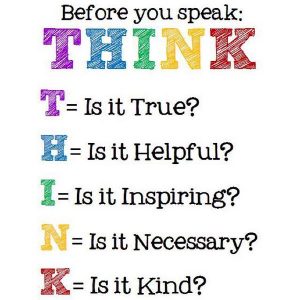
Pastor Rich Knight
Central Congregational Church
June 3, 2018
James 3:1-12
I’m thinking about preaching through the Letter of James this summer. It’s one of the most practical books in all the Bible. So that book of the Bible has been on my mind this week, and then following the events in the news this week, I couldn’t help but think of chapter 3. You’ll see what I mean.
James 3:1-12
Not many of you should become teachers, my brothers and sisters, for you know that we who teach will be judged with greater strictness. For all of us make many mistakes. Anyone who makes no mistakes in speaking is perfect, able to keep the whole body in check with a bridle. If we put bits into the mouths of horses to make them obey us, we guide their whole bodies. Or look at ships: though they are so large that it takes strong winds to drive them, yet they are guided by a very small rudder wherever the will of the pilot directs. So also the tongue is a small member, yet it boasts of great exploits. How great a forest is set ablaze by a small fire! And the tongue is a fire. The tongue is placed among our members as a world of iniquity; it stains the whole body, sets on fire the cycle of nature, and is itself set on fire by hell. For every species of beast and bird, of reptile and sea creature, can be tamed and has been tamed by the human species, but no one can tame the tongue—a restless evil, full of deadly poison. With it we bless the Lord and Father, and with it we curse those who are made in the likeness of God. From the same mouth come blessing and cursing. My brothers and sisters, this ought not to be so. Does a spring pour forth from the same opening both fresh and brackish water? Can a fig tree, my brothers and sisters, yield olives, or a grapevine figs? No more can salt water yield fresh.

“Words, Words, nothing but words.”
“Talk is cheap. He’s all talk. She’s just a talker.”
These expressions illustrate the under-valuing of words, a failure to appreciate their power.
“Ah, I was just talking. I didn’t mean anything by it. It was just words.”
Or how about, “Sticks and stones may break my bones, but names will never hurt me.”
Not true, of course.

Words can hurt and heal; they can cut, they can console; they can insult and they can inspire. There are few things more potent in the world than words.
“I love you.”
“I forgive you.”
“I’m sorry.”
“I do.”
When our Founding Fathers wanted to be free from the British, they decided to use their words and write a nice letter to good ole King George.
When Martin Luther King, Jr. sought to call our nation back to its founding values, that “all men are created equal,” he primarily used his words – in his sermons and speeches – as he led us towards that dream and vision of equality.
It’s said that during the air strikes of WW II, Winston Churchill saved London with his words. Churchill stayed in the city during the bombings and would talk on the radio most every night. Just words – but words with power, conviction and authority.
When God and Moses decided that the Israelites were going to need some clear instructions for keeping up their end of the Covenant, God and Moses decided they’d better write it down. Words, just words. But we’ve been studying the Ten Commandments ever since.

When God’s Son came to earth he went from town to town doing basically two things – healing and speaking. In fact, he often used words to heal:
“Arise and walk. Your faith has made you well.”
“Your sins air jordan 2 cement grey are forgiven. Go in peace.”
The power of words.
Most animals communicate with each other, but it’s the quality, depth and breadth of our communication that makes us very different from the animals. Words.
Think about this: all the co-operation between human beings depends upon verbal communication, doesn’t it? I know it also depends on empathy, wisdom and insights. But we communicate those insights through our words, and we communicate our empathy and emotions through how we speak those words. This is why texting and email is tricky sometimes. You can’t hear the tone of voice, so you have to guess. And often we guess wrong. Words, living face-to-face words are all we have to stay connected to one another, to grow together, to share this journey of life together, to be the church together.
James recognized this so well. And he used his words to convey the importance of words. By the way the traditional view is that this James was one of Jesus’ brothers (I guess half-brother technically). James became a disciple and the key leader of the early church in Jerusalem. And so think about how well-acquainted James was with the words of Jesus – what Jesus said and how he said them. Would you have loved to have heard what James heard? Maybe that’s why he knew that our words are so important?
James says that if we can tame our tongues we will be mature adults. That’s what the word “perfect” means in the New Testament, maturity.
Vs. 2: “Anyone who makes no mistakes in speaking is perfect (mature), able to keep the whole body in check.”
James says that our tongues, our words, might seem like little things, but they are mighty in their impact. When we use them wisely we’re on a great path. And when we use them poorly a great fire can be set ablaze.

James says, Look how a bit in a horse’s mouth is a very small thing, yet it guides the entire horse. Think about the rudder on a huge ship, he says. It’s very small in comparison to the ship, yet it’s the most important thing in determining the direction of the entire ship.
He seems to be saying that in the same way that a rudder guides a ship and a bit controls and directs a horse, our words guide and direct our lives. They sometimes steer us into calm seas, and other times our words lead us to crash on the rocks. When we use our words effectively they lead us to more satisfying relationships, to stronger bonds of fellowship, and to a deeper level Nike Air Jordan 1 Mid Khaki , DysongroupShops° , Official Images // Air Jordan Jordan 10 Retro PS 'Powder Blue' "Valentine's Day" of discipleship and faithfulness. James does say that we all make mistakes, and that no one has ever completely “tamed the tongue.” But it’s essential that we are vigilant.
Toward the end of this passage James talks about speaking out of both sides of our mouths. He’s writing about words that are incompatible with one another.

Vs. 9: “With it (our tongue) we bless the Lord and Father, and with it we curse those who are made in the likeness of God. From the same mouth comes cursing and blessing. My brothers and sisters this ought not to be.
We live in vulgar times. The comedian Samantha Bee reminded us of that this week. It’s amazing how our language has deteriorated. We may still be evolving for the good, but our language isn’t.
We also live in racially insensitive times. We live in a day where people air their racist feelings as freely as they talk about the weather. Rosanne Barr used a racist slur that has been used against African-Americans for 400 years. How she could not know that that would get her fired is beyond me.
We need to be reminded of the power of words. Words matter.
Emily Dickinson said this: “I know nothing in the world that has as much power as a word. Sometimes I write one, and I look at it until it begins to shine.”
Someone has said this about the importance of words: “One of the clearest sign of a moral life is right speech. Perfecting our speech is one of the keystones of mature people.”
In Buddhism, “Right Speech” is part of The Eightfold Path eight practices central of Buddhist: right view, right resolve, right speech, right conduct, right livelihood, right effort, right mindfulness, and right union adidas Basic Insulated Μπουφάν.

#3 Right Speech: no lying, no rude speech, no telling one person what another says about him, only speaking that which leads to salvation.
Words have the power to help, to heal, to hinder, to hurt, to harm, to humiliate and to humble.
The Apostle Paul knew the power of words.
Ephesians 4:29 – Do not let any unwholesome talk come out of your mouths, but only what is helpful for building others up according to their needs, that it may benefit those who listen.
Colossians 4:6 – Let your conversation be always full of grace, seasoned travis scott air jordan 1 retro low og black olive release date fall 2024 with salt, so that you may know how to answer everyone.
Old King Solomon knew the power of words, and he collected a number of sayings, proverbs, from the ancient world. Here are a few:
Proverbs 11:12 “It is foolish to belittle a neighbor; a person with good sense remains silent.”
Proverbs 15:1 “A gentle answer turns away wrath, but hard words stir up anger.”
Proverbs 15:4 “Gentle words bring life and health; a deceitful tongue crushes the spirit.”
Proverbs 16:24 “Kind words are like honey—sweet to the soul and healthy for the body.”
Proverbs 18:4 “A person’s words can be life-giving water; words of true wisdom are as refreshing as a bubbling brook.”
Proverbs 18:20 “Words satisfy the soul as food satisfies the stomach; the right words on a person’s lips bring satisfaction.”
Proverbs 20:15 “Wise speech is rarer and more valuable than gold and rubies.”
May we be wise with our speech.
May we be gentle and respectful with our words.
May we be truthful with our words.
May we be people whose word and words mean something.
May we use our words to encourage and build others up.
Let beautiful, life-giving words fill the world, and let it begin with us. Amen.

Closing Thought:
Christian psychologist Gary Chapman in his book, Love as a Way of Life says that our words can either be ‘bullets or seeds’.
Bullets take away life. Seeds bring forth life.
May our Words be seeds of faith, hope & love this week.
Amen.

